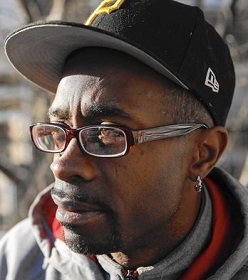 Lionel White Sr. (Chicago Tribune Photo/Jose M. Osorio) In March 2006, a team of Chicago police officers led by Sgt. Ronald Watts came to the door of an apartment at 575 East Browning Avenue in Chicago and threatened to break it down unless the occupant, 33-year-old Lionel White Sr., let them inside.
Inside, Watts demanded, “Give me what you got. Them guys don’t want you selling nothing.” White understood Watts to be asking for any drugs that were in the apartment and that “them guys” referred to Wilbert Moore’s drug-selling operation, which was located across the street at 574 East Browning Avenue.
The officers ransacked the apartment, but found no drugs. Watts and another officer, Kallatt Mohammed, threatened to “get y’all ass” and if Watts ever caught him with drugs, “you’re gonna pay.”
A few weeks later, on April 24, 2006, Watts and officer Alvin Jones returned to the apartment and demanded entry. When White opened the door, officer Alvin Jones punched him in the face and burst inside along with Watts. White ran to a window and began shouting for help, but Jones dragged him back and began beating him. White was handcuffed and arrested. Jones told him he would be charged with aggravated battery.
When White arrived at the police lockup, he learned he was also being charged with possession of 100 bags of heroin. Jones filed a police report, which Watts and Mohammed also signed, saying that while they were conducting a narcotics investigation at 575 East Browning Avenue, they saw White emerge from a hallway, carrying heroin. White saw the officers and fled, but Jones caught and subdued him, but not before White attempted to punch Jones.
Jones said in his report that he blocked White’s punches and subdued him with several blows. During the struggle, White dropped a plastic bag containing 100 bags of heroin, the report said.
Ultimately, White was only charged with possession of the heroin. Because of prior felony convictions, he faced a potential sentence of life in prison without parole. On June 26, 2006, the prosecution made White an offer: plead guilty on the spot in return for a five-year prison term.
White accepted the prosecution’s offer, but during the plea hearing, he said that the officers were “in my house beating me…your Honor. This is wrong. I am pleading guilty because I’m scared. That’s the honest to God truth, your honor.” He then pled guilty to possession of a controlled substance and was sentenced to five years in prison.
While in prison, White wrote to the Chicago Police Office of Professional Standards, which investigates police corruption, and complained that Watts and Jones had beaten and framed him. After White was released from prison on parole in October 2008, he encountered Watts and told him his actions were wrong. Watts replied, “You just caught the bad end of the stick.”
In 2012, Watts and fellow officer Kallatt Mohammed were caught on tape stealing money from a man they believed was a drug courier, but who in fact was secretly working as a confidential FBI informant. In 2013, Watts and Mohammed pled guilty in U.S. District Court to taking money from the informant. Mohammed was sentenced to 18 months in prison and Watts was sentenced to 22 months in prison.
Federal prosecutors said Watts “used his badge and his position as a sergeant with the Chicago Police Department to shield his own criminal activity from law enforcement scrutiny. He recruited another CPD officer into his crimes, stealing drug money and extorting protection payments from the drug dealers who terrorized the community that he [Watts] had sworn to protect.”
In 2006, Ben Baker and his wife, Clarissa Glenn, were convicted of narcotics possession based on false testimony from Watts. In 2016, Joshua Tepfer, attorney at the Exoneration Project at the University of Chicago Law School, and Jonathan Brayman, of the law firm of Breen & Pugh, filed petitions to vacate the convictions, citing the corruption of Watts and his unit. The Cook County State’s Attorney’s Office’s Conviction Integrity Unit agreed that the convictions should be vacated, and the petitions were granted in January and March.
In December 2016, Tepfer and attorney Joel Flaxman filed a motion for a new trial on behalf of White. “The full known scope of the corrupt, more-than-decade-long criminal enterprise of Sergeant Watts…shows that Sergeant Watts led a tactical team of Chicago police officers that engaged in systematic extortion, bribery, and other related crimes…from as far back as the late 1990s through 2012,” the motion said.
On December 14, 2016, the Cook County State’s Attorney’s Office’s Conviction Integrity Unit agreed that White’s conviction should be vacated and dismissed the charge. In January, 2017, Chief Cook County Criminal Court Judge Leroy Martin, Jr., granted White a certificate of innocence. He was awarded $95,500 in state compensation.
In April 2017, he filed a federal civil rights lawsuit seeking damages from the city of Chicago.
In July 2017, two more men who were framed on drug charges by police officers working for Watts were exonerated: Bruce Powell, who had been sentenced to two years in prison and William Carter, who had been framed three separate times from 2004 to 2006 on charges of either possessing or selling cocaine. In November 2017, following a re-investigation of numerous other cases involving Watts, the Cook County State's Attorney's conviction integrity unit dismissed 17 convictions involving 15 more defendants. Those defendants included Lionel White Jr., the son of Lionel White Sr.. Tepfer estimated that at Watts and members of his unit were responsible for at least 500 more convictions.
– Maurice Possley
|